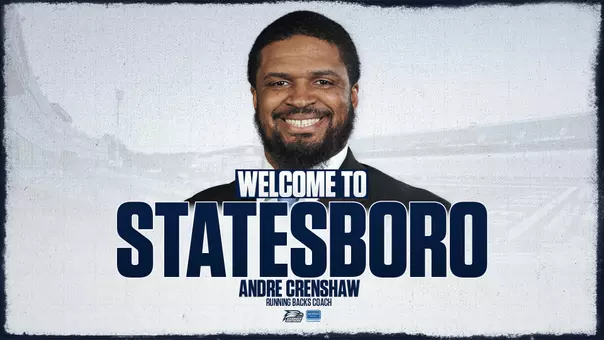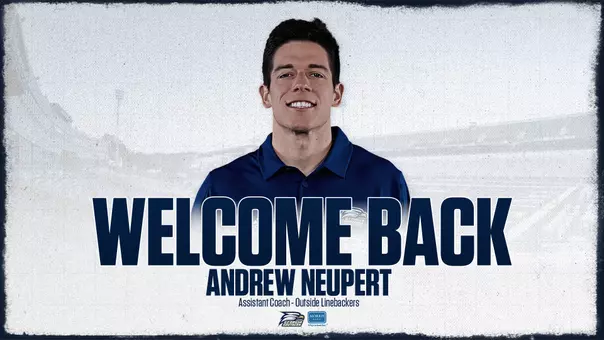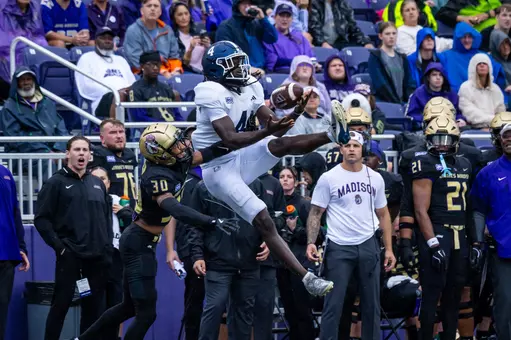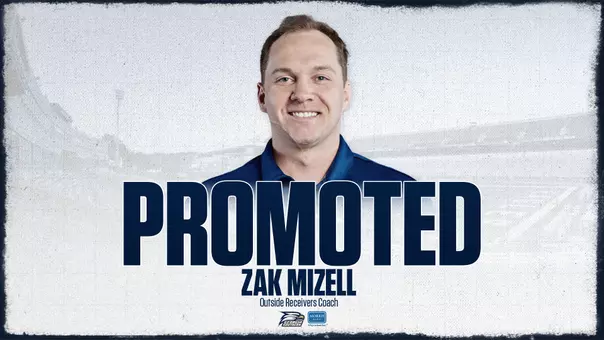
SCHEDULING: 101
3/23/2016 4:06:00 PM | Football
More goes into building a football schedule than meets the eye
Putting together a college football schedule isn't as simple as picking up the phone and signing the contract. Georgia Southern Athletic Director Tom Kleinlein has to take several factors into consideration such as competitive advantage for his team, fan experience and financial needs. The conference office also has some influence on scheduling when it comes to television games in terms of who plays on television and when they play. The Sun Belt mandates that each school plays four home and four away games, while the NCAA mandates that each school play at least five home games and have a complete schedule of 12 games.
But that's not all that goes into forming a schedule, not just for next year, but for several years down the road. In fact, that's just the tip of the iceberg. To get the full scoop on how a college football schedule is formed, GSEagles.com sat down with Kleinlein to pick his brain to learn more about how he puts together the Eagles' slate each year.
Q: Thanks for taking time to talk with us today. Let's start with what is your philosophy on scheduling?
TK: You're going to get an eight-game schedule from the conference, so you have to find four non-conference games per year. At the end of the day, our standing plan has been the same: two money games, try to get a home and home with somebody, and we're going to play an FCS team. That's a schedule we feel that gives us the best opportunity to meet our goals of giving us a competitive advantage, meeting our fans' expectations and meeting our financial needs.
That's a lot easier said than done eight years out than when you enter the FBS after the 2013 season and have to fill a schedule for 2015. It's a process that's going to take some time to play itself out.
Q: Let's start off with what kind of timeline you're working with in terms of this year's schedule and future schedules.
TK: The scheduling of games for the upcoming season actually began back in 2013 and, at that time, there were roughly 10 FBS teams who were looking for a game. Many teams are scheduled five to six years in advance. Schools schedule home games through the following ways: 1) Buy a game, which means we have to offer another team money to come to Statesboro to play; 2) Agree to play a team home and home; 3) Agree to play a team multiple times at their site in order to get a home game at our stadium.
In 2013, none of the teams who were available agreed to play Georgia Southern in a home and home series. We as an institution were not in a position to offer upwards of $750,000 to $1 million to pay a team to come here. I also didn't feel it was appropriate to play teams multiple times at their home site for a reduced rate just to get one home game. That's devaluing our product and doing a disservice to our team and fans.
After exploring these options, we still had the challenge of securing a fifth home game and one additional game in order to complete our schedule and meet both NCAA and conference mandates in terms of scheduling. We offered to play an FCS school and pay them $250,000 in order to get that fifth home game and we decided to take on another road game within the state of Georgia where many of our fans and alumni live. Overall, we ended up with a schedule playing seven times in the state of Georgia and we covered all of our financial needs.
Q: How has scheduling changed with the implementation of the College Football Playoff?
TK: Everyone in college football is competing for a spot in the College Football Playoff and that is a criterion when scheduling for your team.
All of us in the Group of 5 are competing to be the one school that gets the opportunity to play in that one January 1st bowl slot. Everybody is looking for the formula to give their team the best advantage to get into the Playoff and any school needing a game is going to want us to go there as opposed to them coming here because of the perceived notion of home field advantage.
Q: How difficult is it to project what a good matchup is when you're scheduling so far out?
TK: You sit here today scheduling games for 2020, 2021, 2022 and I've even seen games being signed for 2028. You have to take into account that the team you're scheduling today is obviously going to be a different team when you play them so how do you project that in terms of what our goals are? For example, there are so many factors affecting the level of your opponent. What if there's a coaching change? You can't predict that. On the financial side, how do you predict the market of a game five years out? Teams are paying $1.5 million for a game today that they were paying $650,000 to $800,000 just five years ago. A Group of 5 or a Power 5 school is also reluctant to schedule successful teams if there are options because in the age of the Playoff, you could be eliminated from consideration with on loss or even a close win.
Q: How limited are you in what you can offer financially, the size of Paulson Stadium and the infrastructure of Statesboro?
TK: Statesboro is a great destination for people to come and play here. You can bring donors and take them to Hilton Head, Savannah, Sea Island and the surrounding areas. There's a lot to offer. Where it becomes a challenge for us, let's say we play a regional Power 5 team ... they're going to ask me for 5,000 or more tickets. That's a fifth of our stadium that I have to give up to them. Granted, we'll make revenue on those tickets, but we're cutting out a group of people who may want to see that game. Now, you want to create that kind of demand as an athletic director, so that's not a bad problem to have. Our stadium size is not a significant problem, it's convincing a Power 5 team to give up its home game revenue that's proving to be problematic.
An FBS, Power 5 school is probably averaging between $1 and $2 million in revenue for a home game, plus the economic impact that it makes in that community. So to move that game, you're having to throw a number out there that would at least cover their home game and justify the economic impact loss to the community that surrounds that team. A team like Alabama has four conference home games and then can turn around and pay three to four teams anywhere from $750,000 to $1 million to come play there because they're generating well above $2 or $3 million dollars per home game. In addition, the economic impact of these home games is a huge political challenge when you're trying to convince a team to play here.
We're also limited in the resources to pay people. The teams that we "buy" are FCS schools we have the ability to pay. We don't have the ability to go buy a Group of 5 game right now. I can't say "I'll pay you $750,000 to come play in Statesboro." I can't do that. I have a fiscal responsibility to this department and university, so our financial ability to attract a team to come here is very limited.
Q: Scheduling isn't an overnight process. Can you talk about the process with getting bigger-named opponents on the home schedule?
TK: Sure. Scheduling is a continual process. Every school is different and every school attacks it differently. You look at Marshall and what they did. It took them a while. There were a few times they played only five home games a year and it took them almost nine years to get what's now considered a Power 5 team to play in Huntington. Boise State, it took them a while to get a Power 5 school to play at their place and I don't know if they have a Power 5 team coming to them on a regular basis now. Look at UCF, they played on Tuesday nights, Wednesday nights and Thursday nights to get on TV whenever they could to build their national brand. There is a lot of unique ways to go about scheduling when you're making the transition. It's not just who you play, but when you play. In college football at the FBS level, if you're successful, you're going to be on TV and maybe at some odd times or during the week. I look at it as a benefit. It gives us a chance to show the world what we have here at Georgia Southern. It gives us a chance to create a great game-day environment that we can turn around to sell to ESPN.
Q: It's a good thing when ESPN wants you on their networks. Some people may complain about having to miss work when the team plays during the week, but it's a good thing that they chose you. How can you use the national exposure to your advantage?
TK: Look at two schools, Virginia Tech and Louisville. Both schools were Big East schools at a time when there was uncertainty within the conference and people were looking to break away and move conferences. Louisville was one of those schools that would play any time and anywhere that they could. Virginia Tech really developed this uniqueness to their home environment that every time you turned on Thursday night football, Virginia Tech was playing and they had a full stadium; it was a great environment and great atmosphere. Same thing with Louisville. All of a sudden, there's a chance to move conferences, and now they're both in the ACC. Does that happen without that exposure and them opening that window to allow everyone to see their program? I don't know if that's the main reason, but I think it had something to do with it.
We have to treat it the same way. We have to show people what we're about and what we can do. Mid-week football is an advantage if fans and the community buy into the fact that we're trying to expose the world to our program, to our game-day environment and show everybody what we have to offer.
Q: How important is it to be a good member of the Sun Belt Conference and play mid-week games if the conference asks you to?
TK: We have a contract with ESPN and I think it's important that we uphold that contract. If ESPN selects us to play a mid-week game, we should do everything we can to play that game. And we should do everything we can to promote it and provide the best opportunity for people to look at our product. I understand our fans' perspectives that our football games are all-day events on Saturdays and that's the culture and the world they've grown up in for numbers of years. I respect that and want us to have that environment as much as we can. If we could play every game on Saturday and be on national TV, that'd be the perfect world. They could get their 8-10 hour social event, their tailgating, family time, the football game and we could get our opportunity to be on TV. But right now, the Sun Belt is going to play games during the week. They're going to play games at times when they get the opportunity to be on TV and we've got to respect that. We, as a conference member, have to adhere to those rules and policies and we will do that.
Q: A lot of people don't realize that game days and kick times aren't always determined by the schools and that most of the time the networks choose the times and days. Could you explain how TV factors into when we play games?
TK: I've been at Power 5 schools where we didn't even put times out because we didn't know if we were going to kick at 12 or 1 or when it'd be. At other schools I was at, our fans would have issues where they knew what day we were playing on, but didn't know if it was a 12 o'clock game, a 2 o'clock game, a 3 o'clock game, a 7:30 game or a 10 o'clock ESPN game because ESPN had 12 days to decide that. I think TV has had an affect on many things that affect game day for fans attending games. However, TV is here to stay.
What we have to take advantage of is the window that TV provides the rest of the world into our programs. We as an institution and a Sun Belt Conference member and an athletic department have to value that window and we need to be a part of that to help grow our institution. That's why we made the move that we made to the FBS. We also must continue to work on making our game day environment as special as we can for fans who attend our games.
At the end of the day, when you are a successful program, we're going to be on TV. When that window opens and that game airs on TV, the first five minutes of what viewers see determines their perception of Georgia Southern Athletics. I go back to back to Virginia Tech. When they kicked off on Thursday nights, Enter Sandman was playing, the band was jumping up and down and fans were going crazy. What an unbelievable atmosphere. If you listen to anyone talk about Virginia Tech, they talk about a great atmosphere. Well, they did that on Thursday nights. They weren't always playing on Saturdays. People would drive in from hours away to Blacksburg to be a part of that experience. Blacksburg is very similar to Statesboro in size and location. It can be done, it just requires a willingness from fans and students to show up and provide a game day atmosphere that people desire because it's special and unique.
If we continue have a full stadium with 10,000 students in Paulson when we kick off and our team does their part and wins the game and our fans, students, band and cheerleaders continue to do their part to show up and create our unbelievable atmosphere ... we will continue to gain the national exposure that we desire for our university and athletic department though ESPN. But if we show up and we play and we win and it's an empty stadium, I don't know if that's a very good message to a lot of people. That's why it's important that everyone continues to do their part. TV is inevitable if you're successful in this day and age; that's just the way it's going to be. We just have to continue to use it to our advantage and I'm confident that Eagle Nation will continue to show up no matter when we play and continue to make Paulson Stadium one of the most exciting venues in all of college football.
Thanks for your time.
TK: Thank you!
But that's not all that goes into forming a schedule, not just for next year, but for several years down the road. In fact, that's just the tip of the iceberg. To get the full scoop on how a college football schedule is formed, GSEagles.com sat down with Kleinlein to pick his brain to learn more about how he puts together the Eagles' slate each year.
Q: Thanks for taking time to talk with us today. Let's start with what is your philosophy on scheduling?
TK: You're going to get an eight-game schedule from the conference, so you have to find four non-conference games per year. At the end of the day, our standing plan has been the same: two money games, try to get a home and home with somebody, and we're going to play an FCS team. That's a schedule we feel that gives us the best opportunity to meet our goals of giving us a competitive advantage, meeting our fans' expectations and meeting our financial needs.
That's a lot easier said than done eight years out than when you enter the FBS after the 2013 season and have to fill a schedule for 2015. It's a process that's going to take some time to play itself out.
Q: Let's start off with what kind of timeline you're working with in terms of this year's schedule and future schedules.
TK: The scheduling of games for the upcoming season actually began back in 2013 and, at that time, there were roughly 10 FBS teams who were looking for a game. Many teams are scheduled five to six years in advance. Schools schedule home games through the following ways: 1) Buy a game, which means we have to offer another team money to come to Statesboro to play; 2) Agree to play a team home and home; 3) Agree to play a team multiple times at their site in order to get a home game at our stadium.
In 2013, none of the teams who were available agreed to play Georgia Southern in a home and home series. We as an institution were not in a position to offer upwards of $750,000 to $1 million to pay a team to come here. I also didn't feel it was appropriate to play teams multiple times at their home site for a reduced rate just to get one home game. That's devaluing our product and doing a disservice to our team and fans.
After exploring these options, we still had the challenge of securing a fifth home game and one additional game in order to complete our schedule and meet both NCAA and conference mandates in terms of scheduling. We offered to play an FCS school and pay them $250,000 in order to get that fifth home game and we decided to take on another road game within the state of Georgia where many of our fans and alumni live. Overall, we ended up with a schedule playing seven times in the state of Georgia and we covered all of our financial needs.
Q: How has scheduling changed with the implementation of the College Football Playoff?
TK: Everyone in college football is competing for a spot in the College Football Playoff and that is a criterion when scheduling for your team.
All of us in the Group of 5 are competing to be the one school that gets the opportunity to play in that one January 1st bowl slot. Everybody is looking for the formula to give their team the best advantage to get into the Playoff and any school needing a game is going to want us to go there as opposed to them coming here because of the perceived notion of home field advantage.
Q: How difficult is it to project what a good matchup is when you're scheduling so far out?
TK: You sit here today scheduling games for 2020, 2021, 2022 and I've even seen games being signed for 2028. You have to take into account that the team you're scheduling today is obviously going to be a different team when you play them so how do you project that in terms of what our goals are? For example, there are so many factors affecting the level of your opponent. What if there's a coaching change? You can't predict that. On the financial side, how do you predict the market of a game five years out? Teams are paying $1.5 million for a game today that they were paying $650,000 to $800,000 just five years ago. A Group of 5 or a Power 5 school is also reluctant to schedule successful teams if there are options because in the age of the Playoff, you could be eliminated from consideration with on loss or even a close win.
Q: How limited are you in what you can offer financially, the size of Paulson Stadium and the infrastructure of Statesboro?
TK: Statesboro is a great destination for people to come and play here. You can bring donors and take them to Hilton Head, Savannah, Sea Island and the surrounding areas. There's a lot to offer. Where it becomes a challenge for us, let's say we play a regional Power 5 team ... they're going to ask me for 5,000 or more tickets. That's a fifth of our stadium that I have to give up to them. Granted, we'll make revenue on those tickets, but we're cutting out a group of people who may want to see that game. Now, you want to create that kind of demand as an athletic director, so that's not a bad problem to have. Our stadium size is not a significant problem, it's convincing a Power 5 team to give up its home game revenue that's proving to be problematic.
An FBS, Power 5 school is probably averaging between $1 and $2 million in revenue for a home game, plus the economic impact that it makes in that community. So to move that game, you're having to throw a number out there that would at least cover their home game and justify the economic impact loss to the community that surrounds that team. A team like Alabama has four conference home games and then can turn around and pay three to four teams anywhere from $750,000 to $1 million to come play there because they're generating well above $2 or $3 million dollars per home game. In addition, the economic impact of these home games is a huge political challenge when you're trying to convince a team to play here.
We're also limited in the resources to pay people. The teams that we "buy" are FCS schools we have the ability to pay. We don't have the ability to go buy a Group of 5 game right now. I can't say "I'll pay you $750,000 to come play in Statesboro." I can't do that. I have a fiscal responsibility to this department and university, so our financial ability to attract a team to come here is very limited.
Q: Scheduling isn't an overnight process. Can you talk about the process with getting bigger-named opponents on the home schedule?
TK: Sure. Scheduling is a continual process. Every school is different and every school attacks it differently. You look at Marshall and what they did. It took them a while. There were a few times they played only five home games a year and it took them almost nine years to get what's now considered a Power 5 team to play in Huntington. Boise State, it took them a while to get a Power 5 school to play at their place and I don't know if they have a Power 5 team coming to them on a regular basis now. Look at UCF, they played on Tuesday nights, Wednesday nights and Thursday nights to get on TV whenever they could to build their national brand. There is a lot of unique ways to go about scheduling when you're making the transition. It's not just who you play, but when you play. In college football at the FBS level, if you're successful, you're going to be on TV and maybe at some odd times or during the week. I look at it as a benefit. It gives us a chance to show the world what we have here at Georgia Southern. It gives us a chance to create a great game-day environment that we can turn around to sell to ESPN.
Q: It's a good thing when ESPN wants you on their networks. Some people may complain about having to miss work when the team plays during the week, but it's a good thing that they chose you. How can you use the national exposure to your advantage?
TK: Look at two schools, Virginia Tech and Louisville. Both schools were Big East schools at a time when there was uncertainty within the conference and people were looking to break away and move conferences. Louisville was one of those schools that would play any time and anywhere that they could. Virginia Tech really developed this uniqueness to their home environment that every time you turned on Thursday night football, Virginia Tech was playing and they had a full stadium; it was a great environment and great atmosphere. Same thing with Louisville. All of a sudden, there's a chance to move conferences, and now they're both in the ACC. Does that happen without that exposure and them opening that window to allow everyone to see their program? I don't know if that's the main reason, but I think it had something to do with it.
We have to treat it the same way. We have to show people what we're about and what we can do. Mid-week football is an advantage if fans and the community buy into the fact that we're trying to expose the world to our program, to our game-day environment and show everybody what we have to offer.
Q: How important is it to be a good member of the Sun Belt Conference and play mid-week games if the conference asks you to?
TK: We have a contract with ESPN and I think it's important that we uphold that contract. If ESPN selects us to play a mid-week game, we should do everything we can to play that game. And we should do everything we can to promote it and provide the best opportunity for people to look at our product. I understand our fans' perspectives that our football games are all-day events on Saturdays and that's the culture and the world they've grown up in for numbers of years. I respect that and want us to have that environment as much as we can. If we could play every game on Saturday and be on national TV, that'd be the perfect world. They could get their 8-10 hour social event, their tailgating, family time, the football game and we could get our opportunity to be on TV. But right now, the Sun Belt is going to play games during the week. They're going to play games at times when they get the opportunity to be on TV and we've got to respect that. We, as a conference member, have to adhere to those rules and policies and we will do that.
Q: A lot of people don't realize that game days and kick times aren't always determined by the schools and that most of the time the networks choose the times and days. Could you explain how TV factors into when we play games?
TK: I've been at Power 5 schools where we didn't even put times out because we didn't know if we were going to kick at 12 or 1 or when it'd be. At other schools I was at, our fans would have issues where they knew what day we were playing on, but didn't know if it was a 12 o'clock game, a 2 o'clock game, a 3 o'clock game, a 7:30 game or a 10 o'clock ESPN game because ESPN had 12 days to decide that. I think TV has had an affect on many things that affect game day for fans attending games. However, TV is here to stay.
What we have to take advantage of is the window that TV provides the rest of the world into our programs. We as an institution and a Sun Belt Conference member and an athletic department have to value that window and we need to be a part of that to help grow our institution. That's why we made the move that we made to the FBS. We also must continue to work on making our game day environment as special as we can for fans who attend our games.
At the end of the day, when you are a successful program, we're going to be on TV. When that window opens and that game airs on TV, the first five minutes of what viewers see determines their perception of Georgia Southern Athletics. I go back to back to Virginia Tech. When they kicked off on Thursday nights, Enter Sandman was playing, the band was jumping up and down and fans were going crazy. What an unbelievable atmosphere. If you listen to anyone talk about Virginia Tech, they talk about a great atmosphere. Well, they did that on Thursday nights. They weren't always playing on Saturdays. People would drive in from hours away to Blacksburg to be a part of that experience. Blacksburg is very similar to Statesboro in size and location. It can be done, it just requires a willingness from fans and students to show up and provide a game day atmosphere that people desire because it's special and unique.
If we continue have a full stadium with 10,000 students in Paulson when we kick off and our team does their part and wins the game and our fans, students, band and cheerleaders continue to do their part to show up and create our unbelievable atmosphere ... we will continue to gain the national exposure that we desire for our university and athletic department though ESPN. But if we show up and we play and we win and it's an empty stadium, I don't know if that's a very good message to a lot of people. That's why it's important that everyone continues to do their part. TV is inevitable if you're successful in this day and age; that's just the way it's going to be. We just have to continue to use it to our advantage and I'm confident that Eagle Nation will continue to show up no matter when we play and continue to make Paulson Stadium one of the most exciting venues in all of college football.
Thanks for your time.
TK: Thank you!
The GATA Zone - Tennis
Thursday, January 15
Georgia Southern Football Media Availability (12/29/25)
Tuesday, December 30
Georgia Southern vs. Appalachian State Highlights: JLab Birmingham Bowl (12/29/25)
Monday, December 29
Georgia Southern Football Media Availability (12/28/25)
Sunday, December 28




















